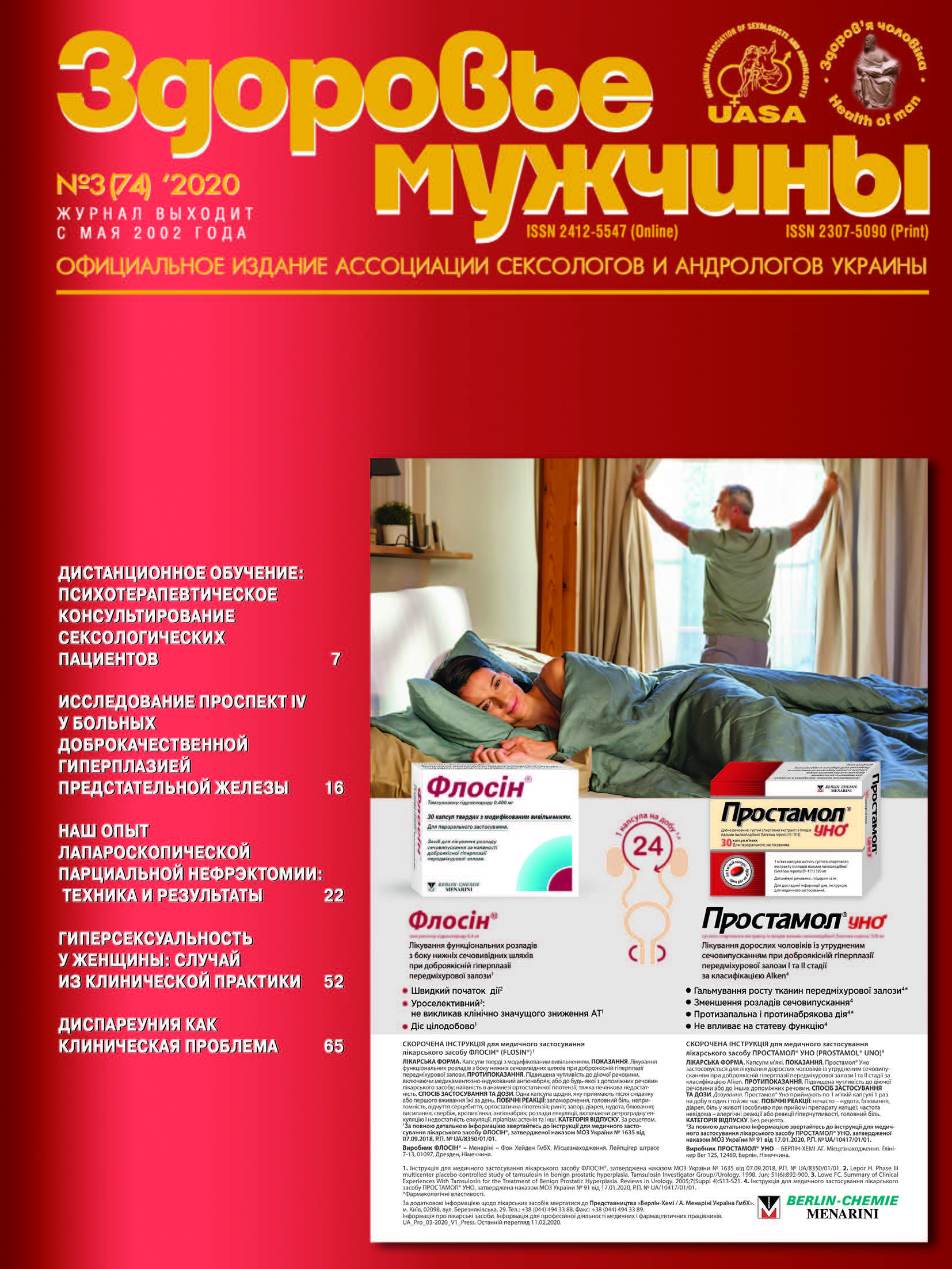Use of Acetylcysteine in the Treatment of Patients with Chronic Prostatitis/Chronic Pelvic Pain Syndrome
##plugins.themes.bootstrap3.article.main##
Abstract
Antioxidants are recommended for the treatment of chronic prostatitis/chronic pelvic pain syndrome (CP/CPPS). The efficacy and safety of quercetin in the treatment of patients with CP/CPPS have been studied most. To increase the effectiveness of treatment, we propose to use acetylcysteine, which, along with antioxidant properties, has secretolytic properties.
The objective: to provide a comparative assessment of the efficacy and safety of quercetin and acetylcysteine in the treatment of patients with CP/CPPS.
Materials and methods. The study involved 60 patients with CP/CPPS aged 18–45 years. Patients were randomized into two comparison groups. Patients in group 1 (n=30) were prescribed quercetin1 g per day for 1 month. Patients in group 2 (n=30) received acetylcyteine orally at a dose of 600 mg per day for 1 month. The condition of patients was assessed according to the NIH-CPSI scale, spermogram parameters and dynamics interlekin-10 (IL-10) and tumor necrosis factor α (TNF-α) in ejaculate. The efficiency criterion was considered to be a 25 % decrease in the NIH-CPSI.
Results. As a result of the treatment of patients with CP/CPPS with the use of antioxidants in both groups symptoms of the prostatitis were reduced: NIH-CPSI total (group 1 – 22,5±0,5 vs. 15,0±0,8; group 2 – 22,7±0,5 vs. 15,1±1,1); pain (group 1 – 11,5±0,3 vs. 7,1±0,4; group 2 – 10,0±0,5 vs. 6,6±0,6); urinary symptoms (group 1 – 3,4±0,3 vs. 2,1±0,2; group 2 – 4,8±0,4 vs. 2,2±0,4), quality of life (group 1 – 7,7±0,4 vs. 5,8±0,3; group 2 – 7,8±0,3 vs. 6,3±0,4). The fertility was improved significantly (p<0,05): increased sperm concentration, progressive sperm motility, decreased number of pathological sperm, leukocyte TNF-α concentration and increased IL-10 concentration in ejaculate. In group 2 only ejaculate viscosity decreased significantly (p<0,05), improved sperm motility, decreased white blood cell count, decreased TNF-α concentration in ejaculate were significantly greater than in group 1. The clinical efficacy of acetylcysteine and quercetin in the treatment of patients with CP/CPPS was 63,3 % and 60,0 % respectively (subject to the efficacy criterion of reducing the NIH-CPSI score by 25 %).
Conclusion. The use of acetylcysteine can be useful for patients with CP/CPPS.##plugins.themes.bootstrap3.article.details##

This work is licensed under a Creative Commons Attribution 4.0 International License.
Authors retain the copyright and grant the journal the first publication of original scientific articles under the Creative Commons Attribution 4.0 International License, which allows others to distribute work with acknowledgment of authorship and first publication in this journal.
References
Castiglione R., Salemi M., Vicari L.O., Vicari E. Relationship of semen hyperviscosity with IL-6, TNF-α, IL-10 and ROS production in seminal plasma of infertile patients with prostatitis and prostato-vesiculitis // Andrologia. – 2014 Dec;46(10):1148–55. doi: 10.1111/and.12207. Epub 2013 Dec 16.
Shoskes D.A., Zeitlin S.I., Shahed A., Rajfer J. Quercetin in men with category III chronic prostatitis: a preliminary prospective, double-blind, placebo-controlled trial //Urology. – 1999. – N 54 (6). – P. 960–963.
Lv C., Zhong Z., Wu Z. et al. Non-bacterial prostatitis in Kunming mouse induced by long-term stimuli of passive sexual abstinence. J. Androl. – 2010. – N 31 (3). – P. 244–249.
Ломоносов С.П. Ацетилцистеин в лечении острых и хронических заболеваний органов дыхания // Укр. мед. часопис. – 1999. – № 1 (9). – С. 100–102.
Wang L.L., Huang Y.H., Yan C.Y., Wei X.D., Hou J.Q., Pu J.X., Lv J.X. N-acetylcysteine Ameliorates Prostatitis via miR-141 Regulating Keap1/Nrf2 Signaling // Inflammation. – 2016. – N 39 (2). – P. 938–947.





